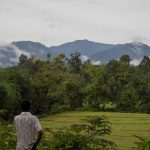Small-scale farming threatens rainforests in Sumatra

Rainforest cover in the Indonesian archipelago has since declined rapidly in recent years giving way to large-scale plantations of rubber and oil palm. A recent study published in Nature Communications finds that small-scale farming can be just as damaging to biodiversity as the plantations, since most farmers prefer profitability over environmental stewardship. A team of 40 scientists from Sweden, Germany, Switzerland, Indonesia and New Zealand collaborated to assess the farming practices of 464 smallholder households—farmers with a median plot size of 2.5 hectares—from 45 villages in the Jambi province of Sumatra. The researchers visited the plots to evaluate land-use choices, forest growth, diversity of local plant and animal species, soil microbes, and ecosystem functions in natural forests as well as in jungle rubber, oil palm and rubber plantations. The team also interviewed the farmers to understand their choices and financial motivations. The scientists found that farmers in Jambi prefer to cultivate oil palm and rubber as single crops, or monocultures, an intensive practice that offers high productivity in the short term.

